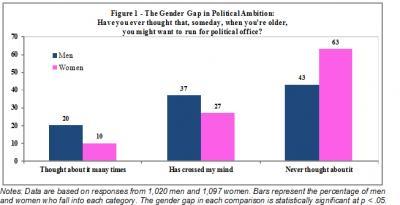Though every election has high-profile female candidates and elected officials, a new paper conducted by American University Women and Politics Institute director Jennifer L. Lawless and Richard L. Fox of Loyola Marymount University says that young women are less likely than young men ever to have considered running for office, to express interest in a candidacy at some point in the future, or to consider elective office a desirable profession.
The survey used 2,100 college students and showed a gap between women and men's interest in running for office; men were twice as likely as women to have thought about running for office "many times," whereas women were 20 percentage points more likely than men never to have considered it (see Figure 1). Importantly, the 20 point gap is just as large as the one we previously uncovered among adult professionals (in their 40s and 50s) who were well-situated to pursue a candidacy.
The report identifies five factors that contribute to the gender gap in political ambition among college students:
- Young men are more likely than young women to be socialized by their parents to think about politics as a career path.

From the report " Girls Just Wanna Not Run: The Gender Gap in Young Americans' Political Ambition
. "Data are based on responses from 1,020 men and 1,097 women. Bars represent the percentage of men and women who fall into each category. The gender gap in each comparison is statistically significant at p < .05. Credit: Prof. Jennifer Lawless American University - From their school experiences to their peer associations to their media habits, young women tend to be exposed to less political information and discussion than do young men.
- Young men are more likely than young women to have played organized sports and care about winning.
- Young women are less likely than young men to receive encouragement to run for office – from anyone.
- Young women are less likely than young men to think they will be qualified to run for office, even in the not-so-near future.
So there is a persistent gender gap in political ambition. Does that mean society is flawed if young women and men are not equally likely to aspire to seek and hold elective office? It does if you run something called the Women and Politics Institute.
Women's organizations recruit heavily on college campuses and since the survey only used college students the results may be even more lopsided. The humanities scholars also advise encouraging parents, family members, teachers, and coaches to urge young women to think about a political career. But why? Politics is nasty business and the women who want to do it are going to do it. Trying to encourage them to do something they are ill-suited to do would be as harmful as encouraging them to buy a gun even if they don't want one. Or trying to convince women who want to be doctors that they should instead be physicists.
Women are competitive, organized sports show that, so it is not the fight that deters young people, and women more than men. It's that politics is a terrible job, where 50% of the populace assumes you are a crook and cheat just because you got elected.





Comments